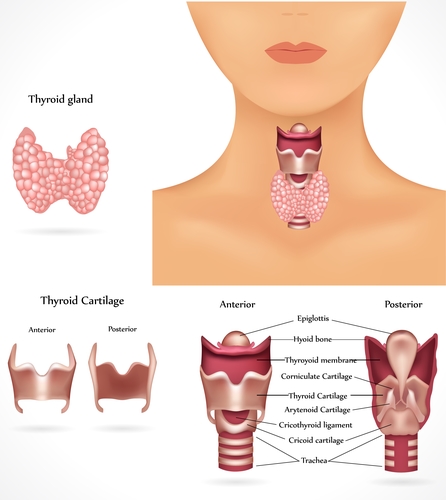Graves’ Disease & Hyperthyroidism
 This disorder occurs when the thyroid gland produces too much thyroid hormone, resulting in an overactive metabolic state. The most common type of this disorder is called Graves’ disease.
This disorder occurs when the thyroid gland produces too much thyroid hormone, resulting in an overactive metabolic state. The most common type of this disorder is called Graves’ disease.
Hyperthyroidism
Symptoms of hyperthyroidism
All of the body’s processes speed up, The possible symptoms of hyperthyroidism include nervousness, rapid pulse, a feeling of being hot, increased perspiration, insomnia and fatigue, shortened attention span, increased frequency of bowel movements, less frequent menstruation, decreased menstrual flow, weakness, hair and weight loss, change in skin thickness, separation of the nail from the nail bed, hand tremors, intolerance of heat, rapid heat beat, goiter and sometimes protruding eyeballs. There is sometimes weight loss, but sometime weight gain as the person’s appetite can be increased.
What is the cause of hyperthyroidism?
The Thyroid gland is the body’s internal thermostat. It regulates the temperature by secreting two hormones that control how quickly the body burns calories and uses energy.
If the body secretes too much hormone, hyperthyroidism results, too little hormone results in hypothyroidism. Many cases of hyper and hypothyroidism is believed to be an improper immune response. The immune system can produce antibodies that attack the thyroid, disrupting hormone production. Grave’s disease is considered an autoimmune disease caused by an abnormally shaped protein stimulating the thyroid to make and secrete more hormones. This can cause an enlargement of the thyroid, bulging eyes, increased heart rate, high blood pressure and anxiety.
Hyperthyroidism can be produced by lumps or tumors which disrupt hormone production.
Infection or inflammation of the thyroid can cause temporary hyperthyroidism. Certain prescription drugs can also cause hyperthyroidism.
A malfunctioning thyroid can be the underlying cause of many recurring illnesses.
When metabolism speeds up, digestion speeds up and malabsorption can occur. A proper diet is important.
The pituitary gland, parathyroid glands and sex glands all work together. If there is a problem in one place, it all may be affected.
What can be done about Grave’s Disease & hyperthyroidism?
Don’t rush into surgery or any other treatment, try diet first.
Eat: plenty of the following foods: Broccoli, Brussels sprouts, cabbage, cauliflower, kale, mustard greens, peaches, pears, rutabagas, spinach and turnips. They tend to suppress thyroid hormone production.
Avoid dairy products for at least three months. Also avoid stimulants: coffee, tea, nicotine and soft drinks.
Recommended:
Essential Oils for Graves’ Disease – this is the plant medicine used for thousands of years. You can read about Essential Oils.
The traditional help is the oils Lemongrass, blue tansy, Endoflex, Myrrh and spruce. All can be used topically or aromatically with a diffuser.
Sign up to receive the MCVitamins Newsletter!
Up-to-date info on the latest health-related news happening in the world
(available in English only)

